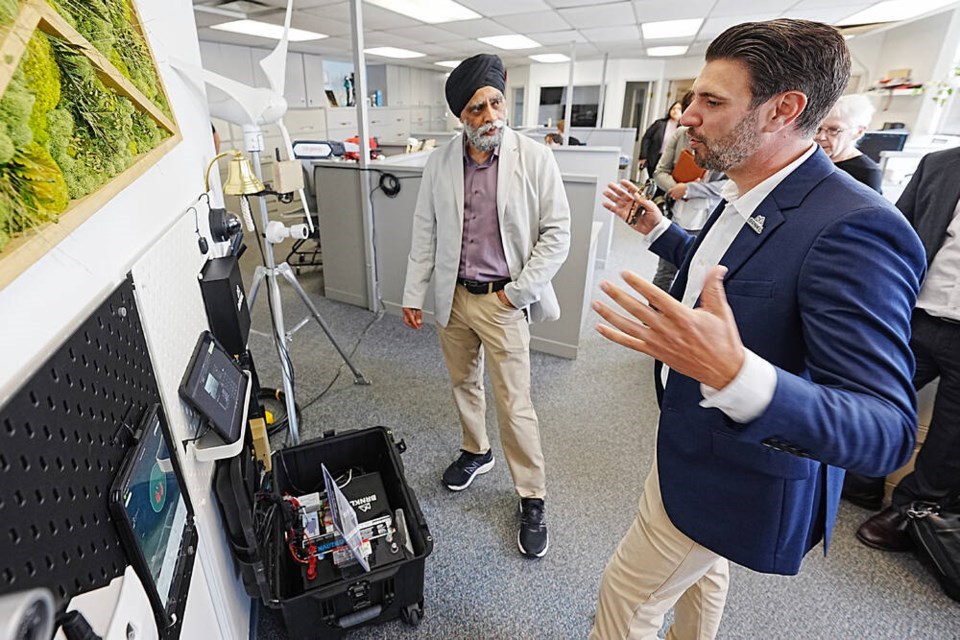A deep pool of talent and cutting-edge marine technology promises an economic outlook for British Columbia’s coast that diverts from tourism, resources and real estate, the current trifecta of coastal business bets.
With pulp mills closing, commercial fishing declining, tourism slowly recovering from COVID and coastal real estate restricted by a combination of high prices, Indigenous land claims and environmental concerns, ocean-related technology is seen shaping the new economy of Canada’s Pacific coast.
An example is Brandon Wright, a University of Victoria graduate who has developed marine surveillance systems after working for the U.S. Central Intelligence Agency and U.S. Air Force.
Wright now runs a company out of Oak Bay Marina that designs remote security and monitoring systems for vessels ranging from small sailing and pleasure craft to fisheries and police boats and Canadian warships.
Barnacle Systems Inc. produces the software and hardware to monitor location, cabin status and engine conditions. In more detailed applications, the software can monitor the vital signs of the ship’s operators.
“We’re installed on the RCMP boats, DFO fisheries, search and rescue vessels and big in special forces and the Royal Canadian Navy,” said Wright, who employs 15 people and sells the systems into 40 countries. “We can pull in engine and camera data, environmental data. It gets the whole health of the boat.
Barnacle Systems represents the region’s deep talent pool and massive potential in the so-called Blue Economy, where research and development is spawning innovation by startup companies in transportation, food, environmental protection and other sectors associated with the ocean.
On June 25, the South Island Prosperity Partnership (SIPP) received $3 million in funding from Ottawa’s Pacific Economic Development Agency to support the ocean and marine technology sectors as well as First Nations groups who are doing ocean monitoring and conservation.
Minister Harjit Sajjan announced a total of $8.1 million in funds that will also support $1.9 million for two projects at the University of Victoria and $820,000 to the Association of British Columbia Marine Industries.
Emilie de Rosenroll, chief executive of the South Island Prosperity Partnership, said the funds will support the development of a marine innovation network and training hub through COAST, which is dedicated to expanding B.C.’s rapidly growing marine technology sectors. The funding will also expand Indigenous entrepreneurship via the Indigenous Prosperity Centre.
SIPP, founded in 2016, has about 70 member organizations including municipal and First Nations governments, industry associations and post-secondary institutions.
COAST has 130 members across B.C., where de Rosenroll said there has been a 70 per cent increase in startup companies involved in ocean-related work.
“It’s sort of like a sleeping giant awakes,” she said.
Jason Goldsworthy, executive director of COAST, said ocean and marine industries are a vital component to the Canadian economy. “There are an increasing number of innovators and entrepreneurs working to better our use and interactions with the ocean,” he said. “We will support these enterprises on their path to market by finding solutions to key industry challenges.”
De Rosenroll said the ocean industry economy is worth billions of dollars and will grow into trillions in the decade ahead. “We need to start thinking about how we can more sustainably use the assets of the ocean for transportation, food, recreation, and we need innovators to do that.”
Christina Clarke, executive director of the Indigenous Prosperity Centre, said South Island First Nations are already taking roles in the blue economy by using vessels to respond to oil spills, fisheries research and enforcement and monitoring species and environmental conditions.



